HOW CAN WE HELP YOU? Call 1-800-TRY-CHOP
In This Section
Intelligence Meets Inspiration: Celebrating Women in STEM at CHOP
 Persevere, persist, and prioritize. These are some of the powerful words of wisdom that women in science at Children’s Hospital of Philadelphia would like to share with the next generation of female scientists. To celebrate Women’s History Month this year, we are continuing our tradition of highlighting the talented researchers at CHOP who work in the science, engineering, math, and technology (STEM) fields, which have historically been underrepresented by women.
Persevere, persist, and prioritize. These are some of the powerful words of wisdom that women in science at Children’s Hospital of Philadelphia would like to share with the next generation of female scientists. To celebrate Women’s History Month this year, we are continuing our tradition of highlighting the talented researchers at CHOP who work in the science, engineering, math, and technology (STEM) fields, which have historically been underrepresented by women.
Less than 30 percent of the world’s researchers are women, according to data from the UNESCO Institute for Statistics. But, like the inspiring legacy of female trailblazers who came before them, our scientists lead novel research in their respective fields in their united mission to drive breakthroughs for children’s health. This year, we asked each nominee, elected by Research Institute Center of Emphasis leaders, to describe their current research and share one piece of wisdom for aspiring women in science. Here, they tell their stories about what drives them and the challenges that made them who they are today.
Sharon J. Diskin, PhD

Assistant Professor of Pediatrics
My research uses integrative quantitative computational methods and rigorous experimental approaches to understand the genetic basis of childhood cancers and identify new therapeutic targets. My long term goal is to improve outcomes for those diagnosed with cancer or to prevent cancer from initiating. I was drawn to the field of cancer research after a loved one was diagnosed with colon cancer over 20 years ago, prompting a career conversion from the aerospace industry. I remain driven by the amazing young children fighting cancer yet still smiling, and their families.
I would give two words of advice to young women interested in pursuing science – perseverance and balance. Perseverance is an essential quality of all successful scientists. There may be times when it seems that nothing is working, your experiments aren’t working, the road seems too long, you may even think you aren’t cut out for a career in science. Don’t quit, believe in yourself, have perseverance. Equally important, especially for woman, is balance. There will be competing priorities – career, family, friends, and self. Be sure to make time for all of these. Balance will make all the highs and lows of your scientific career better.
Rachel K. Myers, PhD
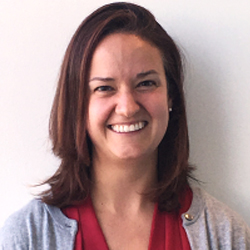
Research Scientist, Violence Prevention Initiative, Center for Injury Research and Prevention
My research focuses on recovery after violence-related injury and developing innovative ways to address the burden of pediatric injuries. I am interested in how we can use technology to reduce the burden on patient families and improve the accuracy of our data. My interest grew from work in adolescent health, where disparities remain in which youth are most affected by violence. Working with a multidisciplinary team, I see firsthand the outcomes our programs help youth achieve, and I am driven to understand what works and how, so we can disseminate our models of care to other institutions.
I encourage young women to seek out mentors and colleagues who help build their confidence, provide critical but supportive feedback, and value their contributions. Science is a team sport, and who we work with can be as important, if not more so, than what the work is. During my first mentored research opportunity, my female mentor suggested to me that a male peer carry out more complicated calculations. While this is not the introduction to the world of science that any young woman should have, it was foundational in helping me to understand the importance of colleagues who respect your skills, provide opportunities for growth, and celebrate successes.
Yael Mossé, MD
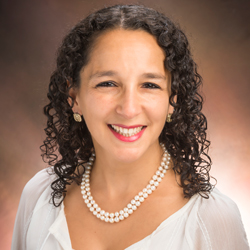
Attending Physician, Division of Oncology
I am a physician-scientist committed to defining and exploiting oncogenic pathways in pediatric cancers – with a focus on neuroblastoma – and translating my basic science discoveries to the clinic. Despite major enhancements in the intensity of therapy over the past several decades, the cure rate for patients with high-risk neuroblastoma lags significantly behind that of other childhood cancers. My lab has unwaveringly focused on the hypothesis that discovery of the genetic basis of this disease will provide insights that are clinically actionable and improve patient outcomes. We have harnessed our discovery of germline and somatic mutations in the Anaplastic Lymphoma Kinase gene as an opportunity to make a big difference for a small group of patients battling this often lethal disease.
Focus. Perseverance. Ruthless prioritization. [These are] distinguishing characteristics that have inspired and motivated me and that I hope to impart to young women in science. Perhaps with these attributes always front and center, one has the opportunity to really do something great.
Sarah Tasian, MD
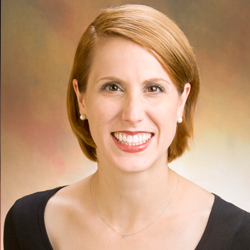
Attending Physician, Division of Oncology
I am a pediatric oncologist and physician-scientist with a research focus on precision medicine therapeutics for high-risk childhood leukemias. My translational lab has two major interests: preclinical testing of kinase inhibitors in genetic subtypes of acute lymphoblastic leukemia (ALL) and acute myeloid leukemia (AML) and preclinical testing of CAR T cell immunotherapies in AML and ALL subtypes. I also lead or co-lead early phase clinical trials in these areas through the Children’s Oncology Group and other consortia. All of this work is truly inspired by our young patients. They quietly show us the real problems in childhood cancer and highlight the gaps in our knowledge as physicians and scientists. We must listen to our patients carefully and deeply, then investigate diligently in the lab how to solve these problems with a goal of bringing better therapies to the clinic as quickly as possible.
Persist! Maintain a laser focus on your goals, and don’t be discouraged if a first (or second or third) attempt doesn’t work. Be open to new ideas and circumstances that may arise along the way, as these opportunities can sometimes be real silver linings.
Elizabeth Walshe, PhD
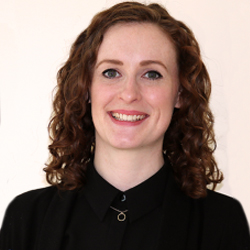
Research Postdoctoral Fellow, Center for Injury Research and Prevention
My research brings together the latest neuroimaging methods with virtual driving technology, establishing the Neuroscience of Driving Research Program. This program bridges basic neuroscience with applied driving research to tackle the public health problem of motor vehicle crashes. My research focuses on understanding how ongoing development of the brain and cognitive function during adolescence may impact the ability of teen drivers, alongside developing simulated driving as an ecologically relevant probe of brain function so that we can investigate typical and atypical neural and cognitive development in adolescents.
Persevere. We use the scientific method as a tool to generate new knowledge and understanding of the world around us: to investigate the unknown. So, by definition, the answer, the solution, and the path ahead will almost never be clear. To be successful in your scientific inquiry, and in a career in science, you must persevere. Keep alive your passion for the scientific method and for using it to create change, inform healthcare, and better our society. This will help you to keep going when you are unsure, get back up when you get set back, and carry on when you learn that it’s not how you thought.
Valentina Graci, PhD
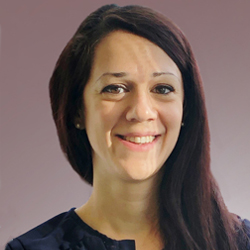
Research Scientist, Center for Injury Research and Prevention
My research focuses on examining how children and adults move when exposed to crash-avoidance maneuvers in vehicles, and how to improve reaction times in autonomous driving scenarios that require manual take over. I conducted biomechanics and human movement research for 10 years before CHOP. Here, I had the opportunity to come face to face with automotive industries and understand their needs for improving occupant safety. This drives my motivation in understanding how to use concepts that are well known in the human movement science world to develop effective novel warning systems for driverless technology.
Be daring and adventurous. There is not just one recipe for success! In a male-dominated world, young female investigators may feel more inclined to follow traditional stepping stones in their career. But we need to be creative in finding opportunities. Before CHOP, I was often told that I did not follow the traditional path and I had changed fields too many times. However, I would not have been able to create my own research questions and feel excited about them if I had not done that. I feel fortunate about the creativity that my eclectic background has given me.
Denise Sabatino, PhD
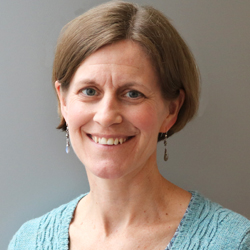
Research Assistant Professor of Pediatrics, Division of Hematology
My research focuses on the inherited bleeding disorder hemophilia and the development of gene therapy to treat this disorder. The current treatment for hemophilia is protein replacement therapy that requires frequent clotting factor infusions to stop bleeding episodes. Using a gene-based approach, our goal is to achieve sustained therapeutic levels of the clotting factor so that patients no longer require frequent protein treatments and to prevent bleeding episodes. We focus on characterizing novel clotting factor protein variants that have enhanced function and other strategies to optimize a gene therapy approach to treat hemophilia. Our work has supported a current clinical trial for gene therapy for hemophilia A. It has been inspiring to see our findings in the laboratory translated into a new treatment for hemophilia.
As young women pursue a career in science, it is important to understand that life will sometimes get in the way and impact your path. Learning to navigate these unanticipated twists and turns with your career goals can be an arduous journey. Embrace the collaboration and support of colleagues, but above all, face these challenges with courage and determination.